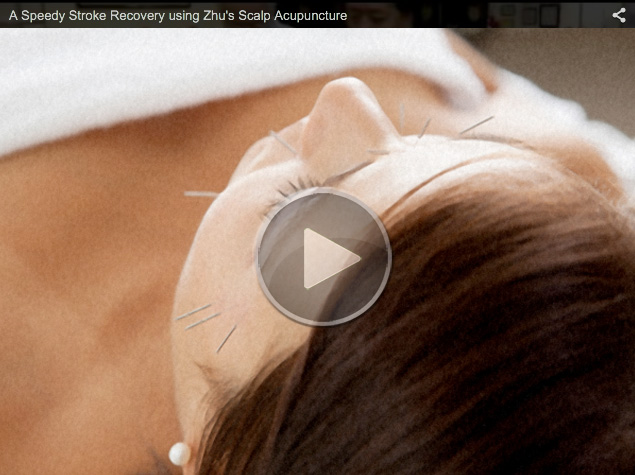Paralysis is a general term for partial or complete inability to voluntarily or involuntarily control a specific muscle/set of muscles. Colloquially, we refer to paralysis as an inability to move all or part of an extremity (arm/hand or leg/foot). Many mechanical and internal medical conditions can lead to paralysis. Mechanical causes include direct trauma to the brain (brain injury, surgery, tumor) or spinal cord (injury, facet stenosis, disk pathology). Medical causes can be vascular (stroke, arterio-venous malformation), inflammatory, infectious, or autoimmune, among others.[1]
Certain traumatic and acute brain/spinal cord insults are incomplete, and reversibility is expected with time, physiotherapy or occupational therapy. Other injuries/insults are complete, such as spinal cord transection, and are never reversible.[1] For conditions which tend to reverse, such as certain strokes, Neurological Scalp Acupuncture may remarkably accelerate recovery[4] – as seen in this video.

The more recent the injury, the more likely an expedited recovery; however, practitioners have reported sustained improvement in older injuries[4], and I have personally witnessed years-old partial paralysis (post-polio partial right leg paralysis) markedly improve upon initial Scalp Acupuncture treatment. There is no certainty of improvement in older conditions. If improvements in a paralytic condition are observed (results should be perceptible during the initial visits), they often prove sustained.[2 3 4]
Neurological Conditions Testimonials
Learn more about Recovery from Stroke
Learn more about Recovery from Spinal Cord Injury
X
These brief overviews of conditions represent distillations of basic and current medical reviews from the following sources:
[1] Conventional Medical Sources
“Harrison’s Principles of Internal Medicine: Volumes 1 and 2, 18th Edition”. Dan Longo Anthony Fauci, Dennis Kasper, Stephen Hauser, J. Jameson, Joseph Loscalzo. McGraw-Hill Professional; (July, 2011)
Medscape eMedicine Physician’s online resource. Various review articles:
Complex Regional Pain Syndromes Treatment & Management.
Anthony H Wheeler MD. Medscape Reference Chief Editor: Stephen A Beman, MD PhD MBA.
Essential Tremor
Deborah A Burke, MD Clinician, Sub-Investigator, Movement Disorder/Parkinson’s Disease Center, University of South Florida College of Medicine; Investigator, Physician, Roskamp Institute Memory Clinic
Bell Palsy
Danette C Taylor, DO, MS Clinical Assistant Professor, Department of Neurology and Ophthalmology, Michigan State University College of Osteopathic Medicine; Senior Staff Neurologist, Henry Ford Health Systems
Meniere Disease (Idiopathic Endolymphatic Hydrops)
John C Li, MD Private Practice in Otology and Neurology; Medical Director, Balance Center
Restless Legs Syndrome
Ali M Bozorg, MD Assistant Professor, Comprehensive Epilepsy Program, Departments of Neurology and Neurosurgery, University of South Florida College of Medicine
Postherpetic Neuralgia
W Alvin McElveen, MD Director, Stroke Unit, Lakewood Ranch Medical Center; Neurologist, Manatee Memorial Hospital
Sleep disorders
Roy H Lubit, MD, PhD Assistant Clinical Professor, Mount Sinai School of Medicine; Clinical Faculty, Department of Child Psychiatry, New York University School of Medicine; Private Practice
Tinnitus
Aaron G Benson, MD Director, Ohio Hearing and Balance Institute, Maumee, Ohio; Consulting Staff, Toledo Ear, Nose and Throat, Inc
Multiple Sclerosis
Christopher Luzzio, MD Clinical Assistant Professor, Department of Neurology, University of Wisconsin at Madison School of Medicine and Public Health
Parkinson Disease
Robert A Hauser, MD, MBA Professor of Neurology, Molecular Pharmacology and Physiology, Director, USF Parkinson’s Disease and Movement Disorders Center, National Parkinson Foundation Center of Excellence, Byrd Institute, Clinical Chair, Signature Interdisciplinary Program in Neuroscience, University of South Florida College of Medicine
Tourette Syndrome and Tic Disorders
William C Robertson Jr, MD Professor, Departments of Neurology, Pediatrics, and Family Practice, Clinical Title Series, University of Kentucky College of Medicine
Post Concussive Syndrome
Roy H Lubit, MD, PhD Assistant Clinical Professor, Mount Sinai School of Medicine; Clinical Faculty, Department of Child Psychiatry, New York University School of Medicine; Private Practice
Traumatic Brain Injury
Segun T Dawodu, MD, JD, MBA, LLM, FAAPMR, FAANEM Associate Professor of Rehabilitation Medicine and Interventional Pain Medicine, Albany Medical College
Dizziness, Vertigo, Imbalance
Hesham M Samy, MD, PhD Head of Hearing and Balance Unit, Otolaryngology Department, Minia University, Egypt
CNS Causes of Vertigo
Marcelo B Antunes, MD Resident Physician, Department of Otorhinolaryngology-Head and Neck Surgery, University of Pennsylvania Health System
Communication Disorders
Renee S Melfi, MD Consulting Staff, Orthopaedic Associates of Central New York
[2], [3]
- “Acupuncture Energetics: A Clinical Approach for Physicians”. Joseph M. Helms. Medical Acupuncture Publishers; 1st Edition. (1995)
- “Foundations of Chinese Medicine: A Comprehensive Text for Acupuncturists and Herbalists”. Giovanni Maciocia. Churchill Livingstone; 2 Edition (July, 2005).
- “Diagnosis in Chinese Medicine: A Comprehensive Guide”. Giovanni Maciocia. Churchill Livingstone; 1st Edition (January, 2004).
Chinese Scalp Acupuncture”. Jason Ji-shun Hao, Linda Ling-zhi Hao and Honora Lee Wolfe. Blue Poppy Press; 1st Edition. (November, 2011)
